Dandruff, a common scalp condition characterized by flaking and itching, affects individuals worldwide. It is often caused by the Malassezia globosa fungus, which thrives on scalp oils and triggers an inflammatory response. Various factors, including genetics, hormones, and environmental triggers, contribute to its development.
This article delves into the causes, symptoms, and effective management strategies for dandruff. It aims to provide a comprehensive understanding of the condition and empower individuals to take proactive steps towards maintaining a healthy scalp.
Introduction
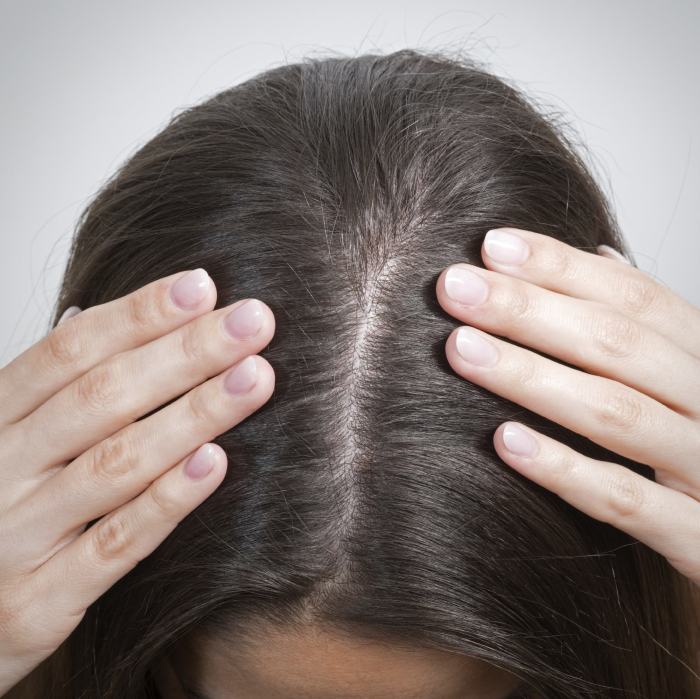
Dandruff, a common scalp condition, is characterized by the shedding of dead skin cells from the scalp. It affects individuals of all ages and ethnicities, causing visible flakes and sometimes scalp itching.
The primary culprit behind dandruff is the Malassezia globosa fungus, a microorganism naturally residing on the scalp. This fungus feeds on scalp oils, producing oleic acid, a substance that can irritate the scalp and trigger dandruff.
Contributing Factors
While Malassezia globosa is a common factor, several other factors contribute to the development of dandruff:
- Genetics: Some individuals are genetically predisposed to having dandruff due to increased oil production or sensitivity to Malassezia globosa.
- Hormones: Androgens, hormones produced in higher levels during puberty and adolescence, can stimulate oil production, contributing to dandruff.
- Environmental Triggers: Certain environmental factors, such as dry air, cold weather, and stress, can exacerbate dandruff.
Symptoms and Diagnosis of Dandruff
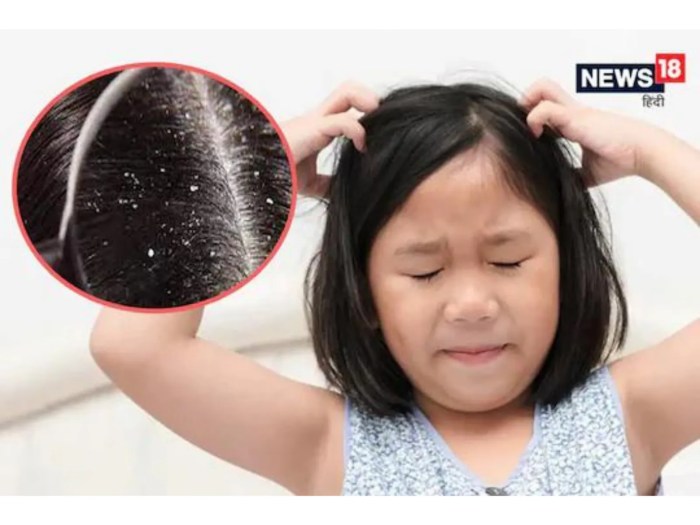
Dandruff is a common scalp condition that affects people of all ages. It is characterized by the shedding of dead skin cells from the scalp, resulting in visible flakes or scales.
Symptoms of Dandruff
The most common symptoms of dandruff include:
- Flaking: The most noticeable symptom of dandruff is the shedding of dead skin cells from the scalp. These flakes can be small and powdery or large and greasy.
- Itching: Dandruff can cause the scalp to become itchy, especially when it is dry or irritated.
- Scalp irritation: Dandruff can also cause the scalp to become red, inflamed, and sore.
Diagnosis of Dandruff
Dandruff is typically diagnosed based on a physical examination of the scalp. During the examination, the doctor will look for signs of flaking, itching, and scalp irritation. The doctor may also ask about the patient’s medical history, including any recent changes in hair care products or habits.
Differential Diagnosis
Dandruff can be distinguished from other scalp conditions with similar symptoms, such as psoriasis, eczema, and seborrheic dermatitis. Psoriasis is a chronic skin condition that causes red, scaly patches on the skin, including the scalp. Eczema is a skin condition that causes dry, itchy, and inflamed skin.
Seborrheic dermatitis is a skin condition that causes red, scaly patches on the skin, often in areas with high oil production, such as the scalp, face, and chest.
Treatment Options for Dandruff
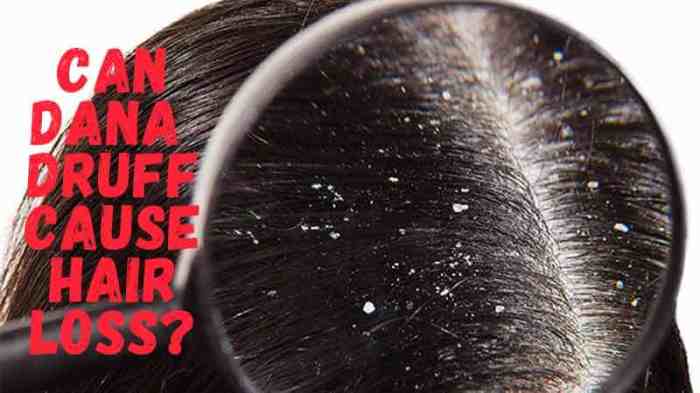
Dandruff can be effectively managed and controlled with a variety of treatment options. These treatments can be categorized into over-the-counter (OTC) and prescription options, each with its own unique active ingredients, mechanisms of action, and usage instructions.
Following the recommended treatment regimen and maintaining a consistent routine are crucial for effective dandruff control. This involves regular use of the prescribed or OTC products, as well as adopting a healthy lifestyle that includes a balanced diet, adequate sleep, and stress management.
Over-the-Counter (OTC) Treatments
OTC dandruff treatments are readily available at pharmacies and supermarkets. They typically contain active ingredients that target the underlying causes of dandruff, such as Malassezia fungi, excess oil production, and skin irritation.
- Anti-fungal Shampoos: These shampoos contain active ingredients like ketoconazole, selenium sulfide, and ciclopirox olamine. They work by killing Malassezia fungi, the primary cause of dandruff.
- Zinc Pyrithione Shampoos: Zinc pyrithione is a common ingredient in OTC dandruff shampoos. It has antifungal and antibacterial properties that help reduce Malassezia fungi and scalp inflammation.
- Salicylic Acid Shampoos: Salicylic acid is a keratolytic agent that helps shed dead skin cells and reduce scaling. It also has anti-inflammatory properties that soothe scalp irritation.
- Coal Tar Shampoos: Coal tar shampoos contain coal tar, a substance derived from coal. It has antifungal, antibacterial, and anti-inflammatory properties that help control dandruff and relieve scalp itching.
- Tea Tree Oil Shampoos: Tea tree oil is a natural antifungal and antibacterial agent. Tea tree oil shampoos help reduce Malassezia fungi and scalp inflammation, providing relief from dandruff and itching.
Prescription Treatments
In cases where OTC treatments fail to provide adequate relief, prescription medications may be necessary. These medications typically contain stronger active ingredients that require a doctor’s prescription.
- Prescription Shampoos: Prescription shampoos may contain higher concentrations of active ingredients found in OTC shampoos, such as ketoconazole, selenium sulfide, or ciclopirox olamine.
- Oral Antifungal Medications: Oral antifungal medications, such as fluconazole or itraconazole, may be prescribed to target Malassezia fungi systemically.
- Corticosteroids: Corticosteroids are anti-inflammatory medications that can be prescribed to reduce scalp inflammation and itching associated with dandruff.
Prevention and Management of Dandruff

Taking proactive steps to manage dandruff can help reduce its occurrence and severity. Simple lifestyle adjustments, gentle hair care practices, and stress management techniques can make a significant difference in maintaining scalp health.
Lifestyle Modifications
A balanced diet and adequate hydration contribute to overall scalp health. Incorporate foods rich in vitamins B, zinc, and omega-3 fatty acids, which support scalp health. Omega-3 fatty acids, found in fish, nuts, and seeds, can help reduce inflammation and promote scalp balance.
Avoid excessive consumption of sugary foods, processed carbohydrates, and saturated fats, as these can contribute to scalp irritation and dandruff flare-ups.
Managing stress levels is crucial for overall well-being, including scalp health. Stress can trigger dandruff flare-ups, so finding effective stress management techniques is essential. Regular exercise, relaxation techniques like meditation or deep breathing, and engaging in enjoyable activities can help manage stress and reduce dandruff.
Gentle Hair Care Practices
Proper hair care is essential in managing dandruff. Choose mild shampoos and conditioners designed for dandruff control. Avoid harsh shampoos, clarifying shampoos, and frequent hot water washes, as these can strip the scalp of its natural oils and exacerbate dandruff.
When shampooing, massage the scalp gently with your fingertips to avoid irritation. Rinse thoroughly to remove all shampoo residue. Avoid scratching or picking at the scalp, as this can cause further irritation and worsen dandruff.
Conditioning the hair helps keep it moisturized and manageable. Apply conditioner to the ends of the hair, avoiding the scalp, and rinse thoroughly. This helps prevent product buildup and keeps the scalp balanced.
Styling Techniques
Heat styling tools like hair dryers, straighteners, and curling irons can contribute to scalp irritation and dandruff. Use these tools sparingly and apply a heat protectant spray before styling to minimize damage to the hair and scalp.
Avoid tight hairstyles, such as cornrows, braids, or ponytails, for extended periods. These can put tension on the scalp and aggravate dandruff. Opt for loose, comfortable hairstyles that allow the scalp to breathe.
Myths and Misconceptions about Dandruff
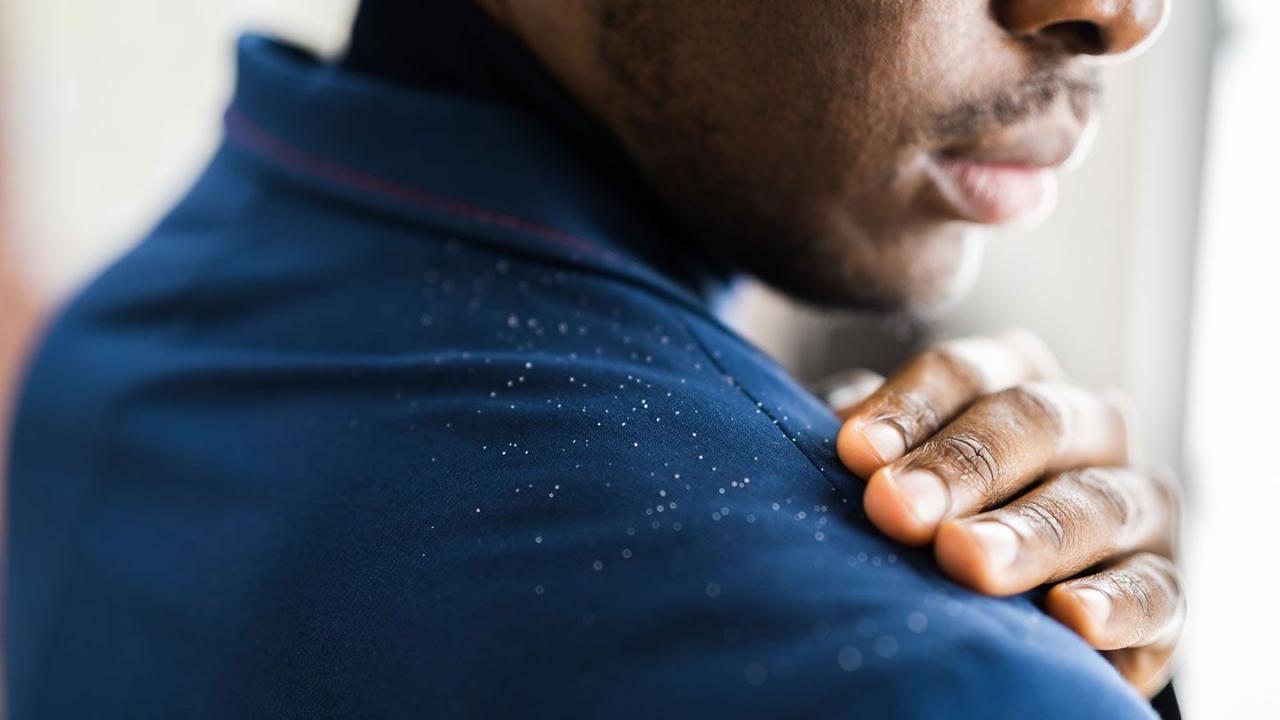
Dandruff is a common scalp condition that affects individuals of all ages and backgrounds. However, there are numerous myths and misconceptions surrounding dandruff that can lead to incorrect assumptions and ineffective treatment approaches. It is crucial to dispel these myths and provide evidence-based information to promote accurate understanding and appropriate management of dandruff.
Myth: Dandruff is a sign of poor hygiene.
Fact: Dandruff is not caused by poor hygiene. It is primarily caused by an overgrowth of a fungus called Malassezia, which naturally lives on the scalp. This fungus feeds on scalp oils, producing oleic acid, which can irritate the scalp and lead to dandruff flakes.
While good hygiene practices, such as regular shampooing and scalp cleansing, can help manage dandruff, they do not prevent or eliminate it.
Myth: Dandruff is contagious.
Fact: Dandruff is not contagious. It is not spread through direct contact with an affected individual or by sharing personal items like combs, brushes, or hats. The Malassezia fungus that causes dandruff is commonly found on the scalp of most people, and its overgrowth is influenced by individual factors such as scalp pH, oil production, and immune response.
Myth: Dandruff can be cured permanently.
Fact: While dandruff can be effectively managed, it is typically a chronic condition that can recur. Treatment options aim to control the overgrowth of Malassezia, reduce scalp irritation, and alleviate symptoms like flaking, itching, and scalp redness. However, it is important to note that dandruff may persist or return due to various factors, including hormonal changes, stress, and underlying medical conditions.
Myth: Dandruff is a serious medical condition.
Fact: Dandruff is generally not a serious medical condition and does not pose significant health risks. It is primarily a cosmetic concern that can cause embarrassment and social discomfort. However, in some cases, severe dandruff may be associated with underlying medical conditions, such as seborrheic dermatitis, psoriasis, or eczema.
If dandruff symptoms are persistent, severe, or accompanied by other skin problems, it is advisable to consult a healthcare professional for proper diagnosis and treatment.
Myth: Self-diagnosis and self-treatment of dandruff are sufficient.
Fact: While mild dandruff can often be managed with over-the-counter anti-dandruff shampoos and home remedies, it is important to seek professional advice for persistent or severe cases. Self-diagnosis and self-treatment may not be effective and can potentially worsen the condition.
A healthcare professional can accurately diagnose the underlying cause of dandruff and recommend appropriate treatment options tailored to individual needs.
Conclusion: Managing Dandruff Effectively
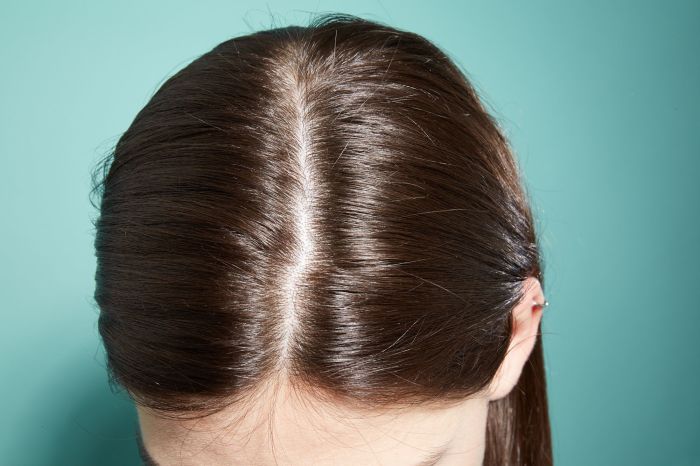
Understanding dandruff, its causes, and treatment options is essential for effectively managing the condition. Seeking professional advice is crucial, especially if dandruff is severe or does not respond to over-the-counter remedies. A comprehensive approach, including proper scalp care, lifestyle modifications, and appropriate treatment, can help control dandruff and maintain a healthy scalp.
Proactive Steps to Manage Dandruff
To effectively manage dandruff, proactive steps should be taken, including:
- Regular Scalp Cleansing: Wash your hair regularly with a gentle shampoo designed for dandruff control. Avoid harsh shampoos and excessive washing, as this can irritate the scalp and worsen dandruff.
- Use Anti-Dandruff Shampoos: Incorporate anti-dandruff shampoos into your hair care routine. These shampoos contain active ingredients that help reduce flaking and itching associated with dandruff.
- Condition Your Hair: Use a conditioner to moisturize your hair and scalp. This can help soothe irritation and prevent dryness, which can contribute to dandruff.
- Healthy Lifestyle: Maintain a healthy lifestyle by managing stress, getting adequate sleep, and eating a balanced diet. These factors can positively impact scalp health and reduce dandruff.
- Avoid Harsh Styling Products: Limit the use of harsh styling products, such as gels, sprays, and mousses, as they can irritate the scalp and exacerbate dandruff.
Final Summary
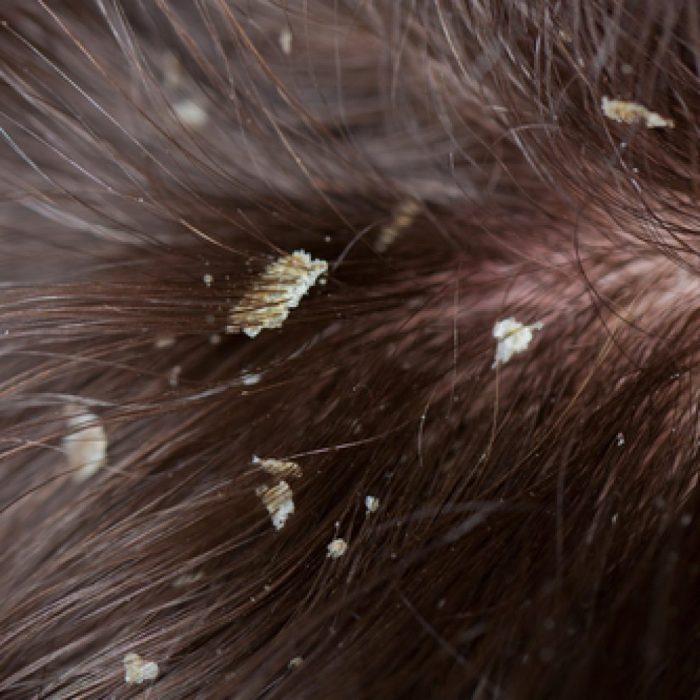
In conclusion, dandruff is a manageable condition with various treatment options available. Understanding the causes and symptoms of dandruff is essential for effective management. Seeking professional advice for appropriate diagnosis and treatment is crucial, especially in cases where dandruff is severe or persistent.
By following recommended treatments and implementing preventive measures, individuals can effectively control dandruff and maintain a healthy scalp.
Common Queries
Q: What is the primary cause of dandruff?
A: The primary cause of dandruff is the Malassezia globosa fungus, which feeds on scalp oils and triggers an inflammatory response.
Q: Can stress contribute to dandruff?
A: Yes, stress can aggravate dandruff symptoms by affecting the immune system and scalp health.
Q: Is dandruff contagious?
A: No, dandruff is not contagious and cannot be transmitted from person to person.
Q: Can dandruff be cured?
A: Dandruff is a chronic condition that can be effectively managed but not cured. With proper treatment and preventive measures, symptoms can be controlled and flare-ups can be minimized.



